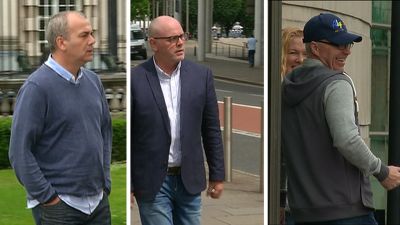Long running trial to hear evidence from covert listening devices

Recordings from covert listening devices have been allowed as evidence in a long-running terror trial in Belfast.
However, a portion of voice recognition evidence which attributes the recordings to three suspects has been excluded in the trial, which has been running for almost a decade.
Colin Duffy, of Forest Glade in Belfast, Henry Fitzsimmons of Dunmore Mews, Belfast, and Alex McCrory of Sliabh Dubh View in Belfast, are charged with directing terrorism and membership of an illegal organisation, namely the IRA.
Fitzsimmons and McCrory are also charged with attempting to murder police officers in a gun attack on the Crumlin Road in north Belfast on December 5, 2013, and with possessing two firearms and ammunition used in the attack.
They have denied the charges.
The trio were granted bail in 2016 after spending more than two years on remand.
The key evidence being used by the prosecution is a quantity of audio which was recorded by the security forces from listening devices planted at various points in Demesne Park in Lurgan, Co Armagh.
The devices picked up a conversation which the prosecution contends was an incriminating discussion between the three defendants.
The prosecution argues the recordings show Fitzsimmons and McCrory were "intimately involved" in the Crumlin Road gun attack and that they knew of it, approved it and, in effect, signed off on it before it took place.
However the authenticity of this audio, voice recognition evidence and CCTV evidence has been challenged during the case, which is being heard in a Diplock non-jury trial.
On Friday, Mr Justice O'Hara gave his ruling on a voir dire application brought by the defence.
He said the vast majority of evidence in the case has been called, and it is his task to rule whether any evidence should be excluded on the basis of fairness.
Mr Justice O'Hara said scrutiny has "revealed inconsistencies in the prosecution evidence".
He went on to say he has "misgivings about the way in which the prosecution evidence was given", particularly by a number of security forces witnesses, who he said "appeared to have been trained to be vague and unforthcoming in certain respects".
"But having said that, in light of all of the evidence, the authenticity of the recordings cannot reasonably or sensibly be doubted," he said, pointing to expert evidence that manipulation of the recordings "would be unachievable".
Mr Justice O'Hara also ruled that evidence attributing voice recordings to the three suspects is not admissible, but allowed CCTV evidence.
Another hearing is to be held before October 14 to review the future running of the case.
Want a quick and expert briefing on the biggest news stories? Listen to our latest podcasts to find out What You Need To Know.